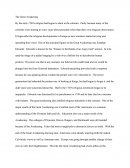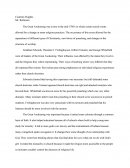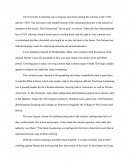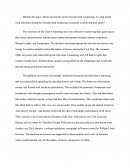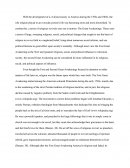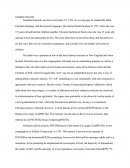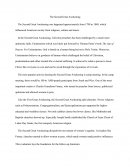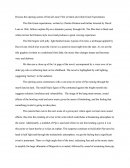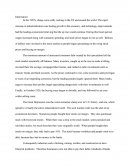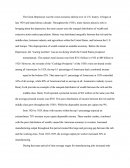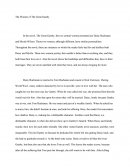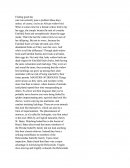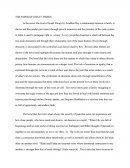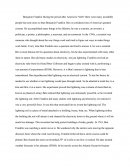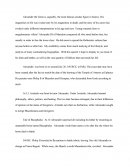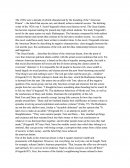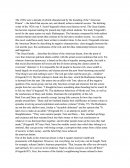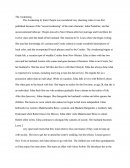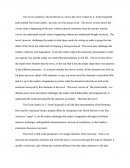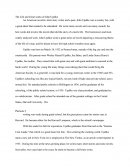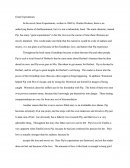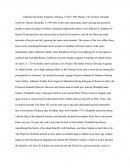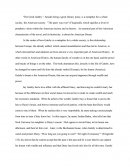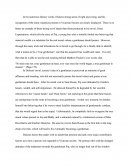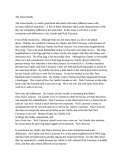The great awakening essays and research papers
Last update: March 14, 2017-
The Great Awakening
The Great Awakening By the early 1700's religion had begun to slack in the colonies. Partly because many of the colonists were starting to worry more about personal riches than their own religious observances. It began after the religious developments in Europe as new ministers started arriving and spreading their word. One of the principal figures in the Great Awakening was Jonathan Edwards. Edwards is known for his "Sinners in the Hands of an Angry
Rating:Essay Length: 491 Words / 2 PagesSubmitted: February 12, 2011 -
The Great Awakening
Courtney Hughes Mr. Robinson The Great Awakening was a time in the mid-1700's in which certain social events allowed for a change in some religious practices. The occurrence of this event allowed for the separations of different types of Christianity, new forms of preaching, and changes in the structure of worship. Jonathan Edwards, Theodore J. Frelinghuysen, Gilbert Tennent, and George Whitefield were all leaders of the Great Awakening. Their influence was affected by the states
Rating:Essay Length: 354 Words / 2 PagesSubmitted: February 15, 2011 -
Great Awakening
The first Great Awakening was a religious movement among the colonies in the 1730's and the 1740's. The movement was needed because of the substantial decrease in the amount of members in the church. The Puritans had "lost its grip" on society. When the New Massachusetts law of 1691 allowed colonial Americans to worship freely and the right to vote, colonist were overwhelmed that they discarded what might be in store for them in the
Rating:Essay Length: 330 Words / 2 PagesSubmitted: February 16, 2011 -
The Great Awakening
Identify the major reform movements of the Second Great Awakening. To what extent were reformers during the Second Great awakening successful in achieving their goals? The reformers of the Great Awakening were very effective in achieving their goals due to their future advancements, and the major reform movements included reforms in abolition, Women's rights, and Temperance. The abolition movement spread the idea that that slavery was wrong. It would eventually lead to the outlaw of
Rating:Essay Length: 287 Words / 2 PagesSubmitted: February 20, 2011 -
Informative - Comparisons of the First and Second Great Awakenings
With the development of a civilized society in America during the 1700s and 1800s, the role religion played in an everyday person's life was becoming more and more diminished. To combat this, a series of religious revivals were set in motion: The Great Awakenings. These were a series of large, sweeping religious, social, and political changes that sought to use the basis of religion to revive faith in a neglected belief, bring about numerous social
Rating:Essay Length: 1,641 Words / 7 PagesSubmitted: February 26, 2011 -
The Great Awakening
Jonathan Edwards Jonathan Edwards was born on October 19, 1703. At a young age, he studied the bible, Christian theology, and the ancient languages. He married Sarah Pierpont in 1727, when she was 17 years old and had ten children together. Edwards had known Sarah since she was 13 years old and had a love and admiration for her. He wrote about how he loved her deep, and devoted love for the Lord. She was
Rating:Essay Length: 391 Words / 2 PagesSubmitted: April 2, 2011 -
Second Great Awakening
The Second Great Awakening The Second Great Awakening was happened approximately from 1790 to 1840, which influenced American society from religions, culture and music. In the Second Great Awakening, Calvinist preachers has been challenged by a much more optimistic faith, Unitarianism which was likely put forward by Thomas Paine’s book The Age of Reason. For Unitarianism, God is based on a human being but not a Holy Trinity. Moreover, Unitarianism believes in goodness of human
Rating:Essay Length: 313 Words / 2 PagesSubmitted: October 1, 2017 -
Discuss the Opening Scenes of David Leans' Film in Black and White Great Expectations
Discuss the opening scenes of David Leans' Film in black and white Great Expectations The film Great expectations, written by Charles Dickens and further directed by David Lean in 1946, follows orphan Pip on a dramatic journey through life. The film shot in black and white mirrors the Dickens style novel and produces a great viewing experience. The film begins with jolly, light hearted music typical of its time, a technique applied by David Lean
Rating:Essay Length: 920 Words / 4 PagesSubmitted: July 15, 2010 -
Economical Events That Lead up to the Great Depression
Information: In the 1920's, things were really rocking in the US and around the world. The rapid increase in industrialization was fueling growth in the economy, and technology improvements had the leading economists believing that the up rise would continue. During this boom period, wages increased along with consumer spending, and stock prices began to rise as well. Billions of dollars were invested in the stock market as people began speculating on the rising stock
Rating:Essay Length: 613 Words / 3 PagesSubmitted: August 22, 2010 -
The Great Depression
The Great Depression was the worst economic decline ever in U.S. history. It began in late 1929 and lasted about a decade. Throughout the 1920's, many factors played a role in bringing about the depression; the main causes were the unequal distribution of wealth and extensive stock market speculation. Money was distributed unequally between the rich and the middle-class, between industry and agriculture within the United States, and between the U.S. and Europe. This disproportion
Rating:Essay Length: 2,990 Words / 12 PagesSubmitted: August 22, 2010 -
The Women of the Great Gatsby
The Women of The Great Gatsby In the novel, The Great Gatsby, the two central women presented are Daisy Buchanan and Myrtle Wilson. These two women, although different, have similar personalities. Throughout the novel, there are instances in which the reader feels bad for and dislikes both Daisy and Myrtle. These two women portray that wealth is better than everything else, and they both base their lives on it. Also the novel shows the hardships
Rating:Essay Length: 1,303 Words / 6 PagesSubmitted: August 22, 2010 -
The Great Imposters
Finding good day care can certainly pose a problem these days, unless, of course, you're an African widow bird. When it comes time for a female widow bird to lay her eggs, she simply locates the nest of a nearby Estrildid finch and surreptitiously drops the eggs inside. That's the last the widow bird ever sees of her offspring. But not to worry, because the Estrildid finch will take devoted care of the abandoned birds
Rating:Essay Length: 1,261 Words / 6 PagesSubmitted: August 23, 2010 -
The Paper of Great Things
THE PAPER OF GREAT THINGS In the novel The God of Small Things by Arudhati Roy a relationship between a family is shown and the painful past comes through several memories and the presence of the caste system in India is used to juxtapose right vs. wrong. A very powerful closeness is observed between the two main characters and through their relationship one of the main themes of love through obscurity is showcased by the
Rating:Essay Length: 1,235 Words / 5 PagesSubmitted: August 23, 2010 -
Bejamin Franklin -- a Life of a Great Man
Benjamin Franklin During the period after America's "birth" there were many incredible people but none more so than Benjamin Franklin. Ben is considered one of America's greatest citizens. He accomplished many things in his lifetime; he was a scientist, an inventor, a politician, a printer, a philosopher, a musician, and an economist. In the 1700s, a scientist was someone who thought about the way things work and tried to figure out ways to make things
Rating:Essay Length: 1,163 Words / 5 PagesSubmitted: August 24, 2010 -
Alexander the Great
Alexander the Great is, arguably, the most famous secular figure in history. His magnetism in life was rivaled only by his magnetism in death, and the story of his career has evoked vastly different interpretations in his age and ours. Young romantic hero or megalomaniac villain? Alexander III of Macedon conquered all who stood before him, but usually in order to free the lower class. He did more to spread the Hellenistic culture than anyone
Rating:Essay Length: 1,057 Words / 5 PagesSubmitted: August 29, 2010 -
The American Dream, and All Its Splendor (great Gatsby)
The 1920s were a decade of rebirth characterised by the founding of the "American Dream" -- the belief that anyone can, and should, achieve material success. The defining writer of the 1920s was F. Scott Fitzgerald whose most famous novel, The Great Gatsby, has become required reading for present-day high school students. We study Fitzgerald's novel for the same reason we study Shakespeare. The literature composed by both authors contains themes and morals that
Rating:Essay Length: 844 Words / 4 PagesSubmitted: September 4, 2010 -
The American Dream, and All Its Splendor (great Gatsby)
The 1920s were a decade of rebirth characterised by the founding of the "American Dream" -- the belief that anyone can, and should, achieve material success. The defining writer of the 1920s was F. Scott Fitzgerald whose most famous novel, The Great Gatsby, has become required reading for present-day high school students. We study Fitzgerald's novel for the same reason we study Shakespeare. The literature composed by both authors contains themes and morals that
Rating:Essay Length: 844 Words / 4 PagesSubmitted: September 4, 2010 -
The Awakening
The Awakening The Awakening by Kate Chopin was considered very shocking when it was first published because of the "sexual awakening" of the main character, Edna Pontellier, and her unconventional behavior. Chopin moved to New Orleans after her marriage and lived there for twelve years until the death of her husband. She returned to St. Louis where she began writing. She used her knowledge of Louisiana and Creole culture to create wonderful descriptions of local
Rating:Essay Length: 656 Words / 3 PagesSubmitted: September 8, 2010 -
The Great Gatsby
The movie created by David Merrick as well as the novel written by F. Scott Fitzgerald, both entitled The Great Gatsby, ate truly two fine pieces of art. The movie version shows the viewer what is happening in the story without internal comments from the narrator and the viewer can understand exactly what is happening without any intellectual thought involved. The novel, however, challenges the reader to look deep inside the writing in order to
Rating:Essay Length: 1,497 Words / 6 PagesSubmitted: September 10, 2010 -
The Life and Great Works of John Updike
The Life and Great works of John Updike An American novelist, short story writer and a poet, John Updike was a country boy with a great talent that needed to be unleashed. He wrote many novels and won many awards; his best works did involve the novels that told the story of a man's life. The best-known and most widely analyzed work, John Updike wrote a great series of novels depicting a reoccurring theme of
Rating:Essay Length: 1,341 Words / 6 PagesSubmitted: September 10, 2010 -
Great Expectations
Great Expectations In the novel Great Expectations, written in 1860 by Charles Dickens, there is an underlying theme of disillusionment, but it is not a melancholy book. The main character, named Pip, has many "great expectations" in his life, but over the course of time these illusions are slowly shattered. This would make one think that this narrative would be a tale of sadness and misery, it is not glum at all because of the
Rating:Essay Length: 596 Words / 3 PagesSubmitted: September 13, 2010 -
Catherine the Great
Catherine the Great: Empress of Russia, (1762-1796) History 120, Section 4 Russell Smith Dr. Homer December 2, 1999 One of the most interesting, hard-working and powerful people to grace the pages of history during the eighteenth century was Catherine II, Empress of Russia. Historians have not always been so kind to her memory, and all too often one reads accounts of her private life, ignoring her many achievements. The stories of her love affairs have
Rating:Essay Length: 3,562 Words / 15 PagesSubmitted: September 14, 2010 -
The Great Gatsby
"The Great Gatsby ", besides being a great literary piece, is a metaphor for a whole society, the American society. "The party was over" (Fitzgerald), which signifies a level of prophetic vision within the American society and its history. An essential part of this American characteristic of the novel, and its historicity, is about the American Dream. At the center of how Gatsby is a metaphor for a whole society, is the relationship between Europe,
Rating:Essay Length: 724 Words / 3 PagesSubmitted: September 15, 2010 -
Gentility in Great Expectations
In his numerous literary works, Dickens strong sense of right and wrong, and his recognition of the many injustices present in Victorian Society are clearly displayed. There is no better an example of these strong set of ideals then those portrayed in his novel, Great Expectations, which tells the story of Pip, a young boy who is initially fooled into believing that material wealth is a substitute for the real moral values a gentleman should
Rating:Essay Length: 2,140 Words / 9 PagesSubmitted: September 17, 2010 -
The Great Gatsby
The Great Gatsby The Great Gatsby is a really good book that deals with many different issues with its many different characters. A few of these characters share some characteristics while they are completely different at the same time. In this essay I will show you the similarities and differences in Jay Gatsby and Nick Carraway. First off the similarities. Although there are not many there is a few to be talked about. Number one
Rating:Essay Length: 483 Words / 2 PagesSubmitted: September 17, 2010
